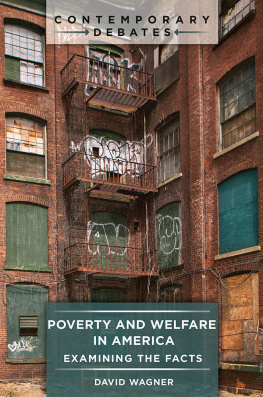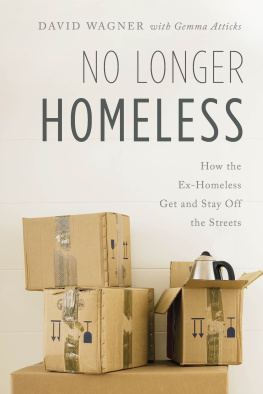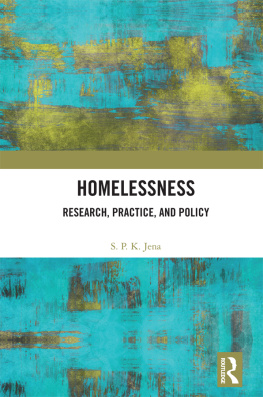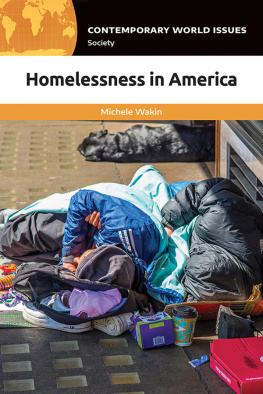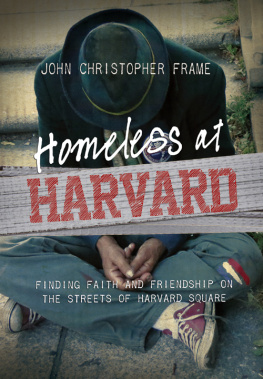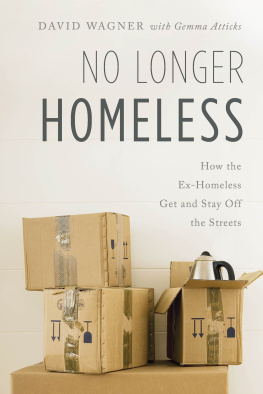Checkerboard Square
Checkerboard Square
Culture and Resistance in a Homeless Community
David Wagner
First published 1993 by Westview Press, Inc.
Published 2018 by Routledge
52 Vandrbilt Avenue, New York, NY 10017
2 Park Square, Milton Park, Abingdon, Oxon OX14 4RN
Routledge is an imprint of the Taylor & Francis Group, an informa business
Copyright 1993 Taylor & Francis
All rights reserved. No part of this book may be reprinted or reproduced or utilised in any form or by any electronic, mechanical, or other means, now known or hereafter invented, including photocopying and recording, or in any information storage or retrieval system, without permission in writing from the publishers.
Notice:
Product or corporate names may be trademarks or registered trademarks, and are used only for identification and explanation without intent to infringe.
Library of Congress Cataloging-in-Publication Data
Wagner, David.
Checkerboard Square: culture and resistance in a homeless
community / David Wagner.
p. cm.
Includes bibliographical references and index.
ISBN 0-8133-1585-9. ISBN 0-8133-1586-7 (pbk.)
1. Homeless personsUnited StatesCase studies. 2. Homeless
personsServices forUnited StatesCase studies. 3. Homeless
personsUnited StatesAttitudesCase studies. I. Title.
HV4505.W23 1993
362.5'0973dc20 93-3744
CIP
ISBN 13: 978-0-367-00478-1 (hbk)
To the memory of
Sam Wagner
and Janice Reiss
This book and the research it is based on could not have taken place without many other people. Although praise or blame for this account of "Checkerboard Square" lies solely with the author, there are some unindicted co-conspirators.
First, Marcia B. Cohen of the University of New England, who is also my wife, was a co-researcher in the first phase of this study (see ) and a continual source of advice, an unofficial editor, and a sounding board throughout the years involved in this project. My debt to her covers the gamut from her work with the research team in phase one of the study, to her help in the conceptualization of many of the ideas, to her constant emotional support.
Second, as in all ethnographic studies, only "informants" among the people studied allow the author in. "Katherine" and "Mitch" served as the primary contacts with the homeless people of "North City" in 1990 and helped me gain initial access to records (such as those of the Coalition for the Dignity of the Homeless and Poor) and, most importantly, to the people of Checkerboard Square, enabling members of the research team to gain the trust of street people. They assisted in many aspects of the study, from going over lists of people, to escorting us in the streets, to constantly answering a myriad of questions. A large number of other homeless and formerly homeless people gave of their time and energies for this project. I particularly want to remember "Nina," who spent so much time giving us the benefit of her near photographic memory about the whereabouts of street people and patiently reviewing lists of names, and "Eric," who I came to know well as the study went on and whose enthusiasm for the book has been unrivaled. "Larry," a worker over the years at several North City agencies serving the homeless, gave unstintingly of his time to help me interpret the subcultures within the street population and the social connections between different social networks.
Third, several students at the University of Southern Maine served as research assistants and wandered the streets, soup kitchens, parks, and agencies to find and talk with street people. Most exceptional was Barbara Reed, who let no obstacle stop her from engaging strangers and writing field notes about what she saw and heard. Laura Madigan also conducted a good number of interviews, and Michelle Raschack was extremely helpful in organizing work with informants and coding. I owe them, and several others who did more limited work, a great debt.
Dean Birkenkamp at Westview Press has been an author's dream of an editor. Dean has been consistently complimentary and supportive as well as thorough and thoughtful. Diana Luykx and Michelle Asakawa of Westview Press also helped me through all the stages of getting this manuscript into a book, and they have been a pleasure to work with.
A number of people read parts or all of this manuscript, and their support and comments were extremely helpful. I wish to thank particularly Joel Blau, Richard Cloward, Dan Cress, Luisa DePrez, David Forbes, Herbert Cans, Bob Hayes, Peter Marcuse, David Snow, and Ida Susser. Finally, I want to thank all the subjects of this book for their time and patience with our intruding into their personal lives, and also the staff of a large number of social agencies, political organizations, and government offices in North City who gave of their time and were always tolerant of our presence and many questions.
David Wagner
1
Beyond the Conventional Wisdom on the Homeless
"Pauperism is the consequence of wilful error, of shameful indolence, of vicious habits. It is a misery of human creation, the pernicious work of man, the lamentable consequence of bad principles and morals."
Charles Burroughs, "Discourse," 1834 (as quoted in Katz, 1986:19)
"The underclass ... urban knots that threaten to become enclaves of permanent poverty and vice ... their chronic lawlessness, drug use, out-of-wedlock births, non-work, welfare dependency and school failure."
Myron Magnet, FORTUNE, (1987:130)
This book is about what used to be called the rabble. The poor, once labeled paupers, vagrants, rabble, the dangerous classes, vagabonds, tramps, and bums, today are the underclass and the homeless. As the quotes abovewritten 150 years apartindicate, little seems to have changed. The very poor have long been objects of fear and loathing in Western society. Their existence is not new, nor are attempts to control them or to limit their political and social rights (see Piven & Cloward, 1971, for the best historical treatment). The poor are stigmatized and blamed for being poor, and they are held responsible for nearly every existing social problem.
Of course, not all poor people are equally stigmatized. Some groups among the poor arouse pity and sympathy and, in modern times, receive some social welfare benefits and charitable aid. Conceptualized as early as the fifteenth century (see Michielse, 1990) and transplanted to America with the English Poor Laws, the historical distinction between the "deserving" and the "undeserving" poor allowed certain groups among the poor to be singled out for particularly harsh treatment, whereas others were given alms and sustenance. As is documented in histories of social welfare (Abramovitz, 1988; Katz, 1986; Piven & Cloward, 1971). compliance with the major shibboleths of bourgeois society has been the primary condition for receiving minimal aid from both the state and private charity: In
Although widows and orphans and later the elderly came to be classified as the deserving poor, men who had no visible means of support were considered vagrants. In colonial and nineteenth-century America, they were singled out for the workhouse or for unceremonious "dumping" at the edge of town. Women who failed to marry or to stay with their families of origin were also considered undeserving and were, at best, excluded from all aid or, at worst, ostracized, institutionalized, and separated from their children. As recent historical analysts have argued, even relatively progressive reforms in social welfare, such as the Social Security Act of 1935, have remained consistent with these ideological themes, with eligibility for aid being contingent on workplace participation and family status (Abramovitz, 1988).


